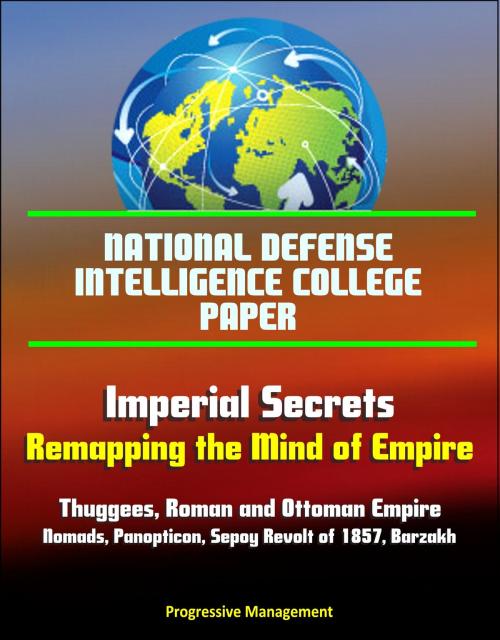National Defense Intelligence College Paper: Imperial Secrets - Remapping the Mind of Empire - Thuggees, Roman and Ottoman Empire, Nomads, Panopticon, Sepoy Revolt of 1857, Barzakh
Nonfiction, History, Military, Other, World History| Author: | Progressive Management | ISBN: | 9781311780980 |
| Publisher: | Progressive Management | Publication: | December 13, 2013 |
| Imprint: | Smashwords Edition | Language: | English |
| Author: | Progressive Management |
| ISBN: | 9781311780980 |
| Publisher: | Progressive Management |
| Publication: | December 13, 2013 |
| Imprint: | Smashwords Edition |
| Language: | English |
This unique and informative paper was produced by the National Intelligence University / National Defense Intelligence College. In this work, Patrick Kelley interprets the intelligence environment of political, military and information empires. His contribution sheds light on the cause of enduring intelligence collection deficits that afflict the center of such empires, and that can coincide with their ebb and flow. Alert intelligence practitioners, present and future, can note here just how useful a fresh interpretation of the intelligence enterprise can be to a coherent understanding of the global stream of worrisome issues. The long-term value of this work will be realized as readers entertain the implications of Churchill's comment that "The empires of the future are the empires of the mind."
Topics and subjects: Thuggees, empires, Ottoman Empire, Roman Empire, Barzakh, Nomads, Indian Sepoy Revolt of 1857, Boudica, Boukoloi, Rhizomatic model, Panopticon, Hellenization, Topkapi Palace, Topkapi Plot
Contents: An Empire of Information. In which terms are not defined— information is considered as the determining quality of political space—cautionary tales are told regarding the pursuit of knowledge: Laplace's Demon and Borges' Map. * Law, Map and Text: How Empires Know * Thuggee: Making the Invisible Visible. In which the British discover a terror network fulfilling its religious vision through the slaughter of innocents (or maybe not)—information anxiety spurs artificial knowledge creation through law—the pressures of knowledge creation contaminate information and undermine the laws of the state. * Sai bil' fesad: Fomenting Evil in the World. In which the Ottomans attempt to know their imperial subjects through the law—legal frames shape social reality—the power of empire is channeled and contested by alternative kinds of legal knowledge. * Rome: Concealing and Revealing. In which the Romans confront illegal enemy combatants of their own: bandits, pirates and rebels—understanding spaces of law shapes understanding spaces of the physical world—alternative meanings and alternative maps. * Barzakh: The Intermediate World. In which spaces outside the law (and the state) emerge as an arena for unfettered information flow—social networks in these outside spaces identified as information conduits—misreading the critical and the irrelevant. * Rhizomes: Unity and Multiplicity. In which the rhizome and tree models of organization are compared (to the latter's discredit)—the routes information travels in an empire are contrasted with the routes the state institutes and monitors—intersections are noted between official and unofficial networks. * Nomads and States: Tent of Osman/House of Osman * Chrono-Politics: The Accelerating Archive. In which empire seeks to shape the present through its records of the past— alternative experiences of time subvert imperial understanding. * Apocalypse: The Sepoy Revolt of 1857. In which the British are surprised by an Indian revolt which very nearly undoes the empire —the master narrative of imperial values drowns out the value narratives of its subjects—the problem of individuals learning to hear competing narratives * Dress, Discourse and Imagination: How Empires Learn to Know Differently * Masquerade: Agents and Actors. In which agents of empire play at being subjects of empire—the costs and benefits of cultural border-crossing are accounted—the spy as compensation for information anxiety—the construction of imperial identity and the loss of information access. * Josephus: The "Hellenizing" Glass. In which the subjects of empire play at being the agents of empire—the problems of communicating cross-culturally—the limitations of native informants. * Derive and Drift: Evliya Celebi
This unique and informative paper was produced by the National Intelligence University / National Defense Intelligence College. In this work, Patrick Kelley interprets the intelligence environment of political, military and information empires. His contribution sheds light on the cause of enduring intelligence collection deficits that afflict the center of such empires, and that can coincide with their ebb and flow. Alert intelligence practitioners, present and future, can note here just how useful a fresh interpretation of the intelligence enterprise can be to a coherent understanding of the global stream of worrisome issues. The long-term value of this work will be realized as readers entertain the implications of Churchill's comment that "The empires of the future are the empires of the mind."
Topics and subjects: Thuggees, empires, Ottoman Empire, Roman Empire, Barzakh, Nomads, Indian Sepoy Revolt of 1857, Boudica, Boukoloi, Rhizomatic model, Panopticon, Hellenization, Topkapi Palace, Topkapi Plot
Contents: An Empire of Information. In which terms are not defined— information is considered as the determining quality of political space—cautionary tales are told regarding the pursuit of knowledge: Laplace's Demon and Borges' Map. * Law, Map and Text: How Empires Know * Thuggee: Making the Invisible Visible. In which the British discover a terror network fulfilling its religious vision through the slaughter of innocents (or maybe not)—information anxiety spurs artificial knowledge creation through law—the pressures of knowledge creation contaminate information and undermine the laws of the state. * Sai bil' fesad: Fomenting Evil in the World. In which the Ottomans attempt to know their imperial subjects through the law—legal frames shape social reality—the power of empire is channeled and contested by alternative kinds of legal knowledge. * Rome: Concealing and Revealing. In which the Romans confront illegal enemy combatants of their own: bandits, pirates and rebels—understanding spaces of law shapes understanding spaces of the physical world—alternative meanings and alternative maps. * Barzakh: The Intermediate World. In which spaces outside the law (and the state) emerge as an arena for unfettered information flow—social networks in these outside spaces identified as information conduits—misreading the critical and the irrelevant. * Rhizomes: Unity and Multiplicity. In which the rhizome and tree models of organization are compared (to the latter's discredit)—the routes information travels in an empire are contrasted with the routes the state institutes and monitors—intersections are noted between official and unofficial networks. * Nomads and States: Tent of Osman/House of Osman * Chrono-Politics: The Accelerating Archive. In which empire seeks to shape the present through its records of the past— alternative experiences of time subvert imperial understanding. * Apocalypse: The Sepoy Revolt of 1857. In which the British are surprised by an Indian revolt which very nearly undoes the empire —the master narrative of imperial values drowns out the value narratives of its subjects—the problem of individuals learning to hear competing narratives * Dress, Discourse and Imagination: How Empires Learn to Know Differently * Masquerade: Agents and Actors. In which agents of empire play at being subjects of empire—the costs and benefits of cultural border-crossing are accounted—the spy as compensation for information anxiety—the construction of imperial identity and the loss of information access. * Josephus: The "Hellenizing" Glass. In which the subjects of empire play at being the agents of empire—the problems of communicating cross-culturally—the limitations of native informants. * Derive and Drift: Evliya Celebi















